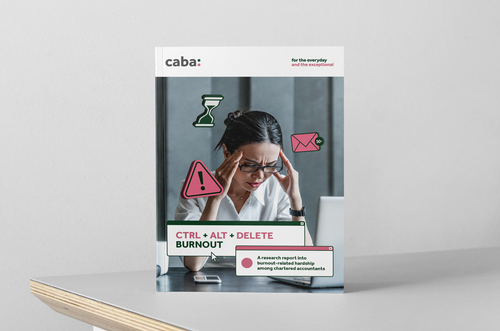burnout at work: advice from a mental health expert
Read more from our mental health expert, Kirsty Lilley, as she shares her thoughts and advice on how chartered accountants and ICAEW members can prevent and address burnout at work.
A career in accountancy can be professionally and financially rewarding - but it can also be stressful. Accountancy is a demanding profession requiring precision and rigour, and the constant pressures of tight deadlines and heavy workloads mean many accountants have first-hand experience of chronic strain.
Accountant burnout is an unpleasant reality - and it's one that's becoming increasingly common. Despite its prevalence, however, indicators of burnout can be difficult to address. Many accountants fear the stigma associated with mental health problems and struggle to speak up before they've experienced significant blows to their mental, physical, and even financial health.
That's why, at caba, we're helping accountants by shining a light on the experience of burnout, providing advice and resources designed to help.
Across the board, accounting firms are facing high turnovers of staff, while the talent pool of young accounting professionals is shrinking. Add economic uncertainty and the potentially existential threat of AI, and it's little surprise that 79% of accountants say poor mental health is a problem in their profession.
These added stress triggers compound the typical pressures of an accounting career. These include:
In addition to the long-standing demanding work culture of accountancy, the recent shift to remote work has also negatively impacted many accountants' mental health. Isolation and loneliness, the blurred boundaries between personal life and the work environment, communication challenges and reduced supervision or support compounds work-related stress and makes it harder to strike a healthy work-life balance.
Burnout rates in the accounting profession are particularly high, especially around busy season. In the UK, meanwhile, our survey found that accountants were over 36% more likely to report feeling stressed or burnt out than employees in other professions.
Our recent report found that 43% of accountants have constantly or often experienced indicators of burnout in the past year. This figure rises to 74% when including accountants who ‘sometimes’ experienced symptoms of burnout in the past year.
We also found that 38% of accountants aged under 30 say they experience indicators of burnout often, which would indicate burnout rate in accountants is higher amongst this age group.
Burnout is aggravated when subjects do not access help. Unfortunately, our survey also revealed that this is a common issue amongst accounting professionals. Almost half of accountants (48%) worried about being treated differently if they admitted to suffering from stress. Furthermore, the same survey 42% feared that admitting to chronic stress would impact on their career progression - a 55% higher rate than employees in other industries.
The most common indictors of burnout in accountancy are:
Read more on burnout and what it looks like.
Unfortunately, accountants are also at risk of the more extreme symptoms of burnout. In severe cases of burnout, sufferers may experience pronounced anxiety or depression, which can severely impact their personal and professional lives.
Recognising these indicators of burnout and addressing them is crucial, to prevent or mitigate its progression. By seeking help and implementing coping strategies, accountants can restore well-being and establish a fulfilling career.

“Being a chartered accountant is a highly respected and rewarding career choice. However, a high-pressure environment can sometimes lead to symptoms we associate with burnout. At caba, we’re committed to providing supportive and confidential help.”
Dr Cristian Holmes, Chief Executive, Caba

We surveyed Chartered Accountants from across the UK and found that 74% have experienced indictors of burnout in the past year. Furthermore, 63% said their current work environment contributed to feelings of burnout.
The accountant burnout report examines key contributing factors and knock-on effects of burnout amongst accountants, uncovers why many do not seek help, and offers guidance to help manage accountancy burnout.

63% of accountants said their work environment contributed to feelings of burnout

45% said indicators of burnout impacted their ability to work or prompted time off

54% said feelings of burnout affected their ability to maintain a healthy work-life balance
“Work gets so busy that you don’t have time for your friends and family. You trick yourself and think “it’s fine”. But those things damage relationships if it happens month after month.”
“When you’re in prolonged periods of stress, sometimes it’s the physical symptoms that show up before you actually know what it is.”
“If I do not stay on top of my health, everything else does start to slip... I experienced quite a lot of personal issues this summer and it was busy season, and it was quite busy and pressured at that time.”
If you recognise yourself in the indicators and experiences of accountancy burnout, it's important that you take steps to change course, as soon as possible. While burnout is best addressed early on, before it significantly impacts your wellbeing, the next best time to act is now.
We’re here to help you find the right support for you, whether that's talking to our registered counsellors or joining our safe and confidential support community to chat to others going through similar experiences.
We're here for you. Our support us free, impartial and confidential. We can arrange for you to receive counselling sessions to help you work through difficulties you're facing.
If you are having suicidal thoughts or need urgent mental health support, you can contact Samaritans for free on 116 213, they are available to talk to 24/7.

Read more from our mental health expert, Kirsty Lilley, as she shares her thoughts and advice on how chartered accountants and ICAEW members can prevent and address burnout at work.

Burnout is when we feel overwhelmed emotionally and physically, so much so, it becomes almost impossible to function in our work or personal life or both. Burnout affects people in different ways, but there are common signs to look out for. Discover what they are by reading this article.

It can be challenging to know how and when to support someone who’s feeling overwhelmed. Here we take a look at how to identify stress in other people, and how you can support them.

Traumatic events affect everyone differently. And sometimes, it doesn’t have to be one big event, it can be a series. Here are some tips to help you move forwards, whatever traumatic event you’ve experienced.
We support past and present members of the Institute of Chartered Accountants of England and Wales (ICAEW), ACA students, ICAEW staff members, and the family and carers of members and students.
Not sure if you’re eligible? Use our interactive eligibility tool to check if you or your family could get support.
Most of our services, including mental health support and legal advice, are provided free regardless of your financial circumstances. For our financial grants, we will conduct an assessment, looking at your income and assets, to determine what help we can provide.
